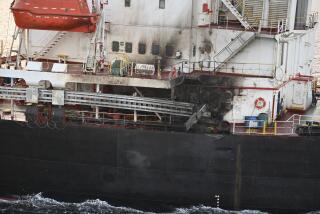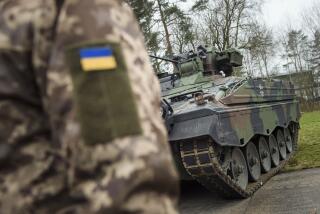Germany OKs Jets to Cover a U.N. Bosnia Withdrawal : Europe: Possible dispatch of six to eight Tornadoes would be Luftwaffe’s first combat mission in 50 years.
- Share via
BONN — In a historic move that could end 50 years of foreign military abstinence, the German government on Tuesday agreed to provide NATO with Tornado jet fighters in the event of a withdrawal of U.N. peacekeepers from Bosnia-Herzegovina.
Chancellor Helmut Kohl’s Cabinet made the decision in response to a request earlier this month from the NATO supreme commander for Europe, U.S. Gen. George Joulwan.
Although the North Atlantic Treaty Organization and the United Nations appear committed to strengthening the 23,000 peacekeepers in Bosnia, and the Tornadoes may never be called, the decision is significant for reunified Germany, which is struggling to define its role in post-Communist Europe.
It is also highly emotional. The contribution of six to eight jet fighters would not make Germany a major military player in the Bosnian conflict, but it would mark the Luftwaffe’s first foreign combat mission since World War II.
The deployment would be legal under a landmark ruling by the country’s highest court last July that Germany may use its armed forces outside the NATO area, in cooperation with international missions and with parliamentary approval.
In its final meeting before Christmas, the Cabinet also offered to provide logistic support to any withdrawal operation in the form of air transport, a mine-sweeping squadron and medical units. But it agreed with Kohl and many opposition leaders that Germany’s history prevents it from sending ground troops to the Balkans, where the Nazis installed the brutal Ustasha regime in Croatia and supported the execution of thousands of Serbs during World War II.
Many Germans fear that their military participation could provoke the Serbs and further complicate the situation, expanding the Balkan conflict.
Another reason for their hesitation is that many political analysts blame Germany for igniting the war in the Balkans in the first place with an overly hasty recognition of Croatia and Slovenia when the republics broke away from Yugoslavia in 1991.
Chancellery Minister Friedrich Bohl said NATO will be advised of the German government’s decision after Parliament is officially informed. The decision must be ratified by a simple majority in Parliament, where Kohl’s three-party coalition holds a 10-seat majority.
The issue has divided the major political parties in recent weeks.
The opposition Social Democratic Party has said it is undecided how it will vote on deployment of the Tornadoes for a withdrawal, but several members have spoken out on both sides of the issue. Their allies in the leftist Greens Party are opposed.
Germany is the only NATO country besides the United States that has the aircraft equipped with sophisticated electronic systems that could neutralize and destroy Serbian antiaircraft missiles during a contested withdrawal. This equipment can detect radar beams from a surface-to-air missile and fire rockets back at the source of the beams.
Bohl said American planes are tied up in Iraq.
Opinion polls have shown that most Germans oppose sending combat planes to Bosnia.
Kohl has argued against that sentiment, saying that as May’s 50th anniversary of the Allied victory over Germany approaches--an occasion Germany celebrates as a liberation from Hitler--the country must be prepared to return the support it received from the West to rebuild and the protection it received during the Cold War.
German newspapers have hotly debated the issue--and Germany’s role as Europe’s largest economy, in general--ever since Joulwan made the request for help earlier this month.
“Germans feel, know deep in their hearts, that the dream of Switzerland has ended,” columnist Josef Joffe wrote in the newspaper Sueddeutsche Zeitung, referring to Germany’s decades of military abstinence. “Today it is not about conquering and aggression, not about the ‘place in the sun,’ not about going it alone in the name of the only true nation. On the contrary, it is about joint action and international responsibility. The Germans shall not rule, but help; they shall not repeat history . . . but prevent it from happening again as much as possible.”
More to Read
Sign up for Essential California
The most important California stories and recommendations in your inbox every morning.
You may occasionally receive promotional content from the Los Angeles Times.













